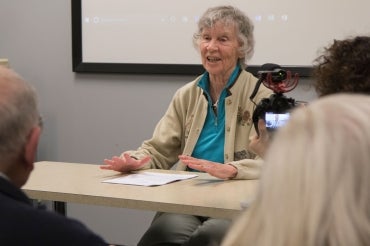Teaching in the community: Free course introduces Toronto residents to U of T's most famous scholars

Published: November 23, 2017
On a Wednesday night in November, students file into a small classroom at University of Toronto’s Innis College, eagerly anticipating the start of a weekly lecture.
But this isn’t your typical university class. There are no assignments, exams or tuition, and the average attendee is decades older than the undergrads who usually fill the seats.
The students are here for a ten-week course offered twice a year called University in the Community. The free program is aimed at Torontonians who have never been to university, but is open to anyone.
It’s an initiative by non-profit adult education organization Workers’ Educational Association, in partnership with U of T’s Innis College and Senior College, a community of retired academics and librarians at the university.
“University in the Community … is helping you explore the questions about the nature of the world you live in that are at the heart of university inquiry,” says University Professor Emeritus Peter Russell, of the department of political science in the Faculty of Arts & Science and principal of Senior College. “For people who for one reason or another don't get to university, it's a fabulous opportunity for them to have that experience in a university setting.”
Learn more about University in the Community
People come from all over the city to take the classes, many of whom are newcomers to Canada or immigrated long ago.
“We are quite a United Nations,” says University in the Community student Nenke Jongkind.
The courses have amassed a loyal following since they started in 2003.
For Severino Centritto, who has participated in the program for 13 years, University in the Community has helped him stay fluent in English, fight fake news with critical thinking and speak more knowledgeably about issues that affect him.
“It's a course without pressure and that is great because we learn more when we are not pressured,” he says.
This year, students are learning about members of the U of T community who helped the university become a world-renowned academic institution – including Sir Frederick Banting and Charles Best, who co-discovered insulin, and trailblazing social historian Natalie Zemon Davis, a professor emerita in the department of history.
Read more about Natalie Zemon Davis
“You see the banners on St. George with the names of people when you come into the university,” says Joanne Mackay-Bennett, University in the Community’s program co-ordinator. “You may recognize the names but you don't really know what they were known for or what they did.”
On this particular evening, students learned about famed communications theorist and U of T professor Harold Innis and his wife, economic historian and dean of women at University College Mary Quayle Innis. They were joined by the Innises' daughter Anne Innis Dagg, who is a famed zoologist and is writing a biography about her mother, and John Bonnett, an associate professor at Brock University who wrote a book about Harold Innis.
As an Innis scholar, teaching a class at Innis College, “was always on my bucket list,” says Bonnett.
Read about another U of T community teaching initiative in Regent Park
Innis Dagg was looking forward to telling the class about her mother, who often gets overshadowed by her father’s celebrity.
“She was a completely amazing women,” says Innis Dagg.
In return for sharing their expertise, professors and other guests learn a lot from students.
“They are really interesting Canadians, interesting citizens of our city, having experiences and challenges that are interesting to hear about and discuss,” says Russell, a regular University in the Community speaker and a fan favourite.



